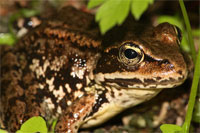New research shows that UVB radiation is not causing the decline of amphibians.
Click image to enlarge Part of the study group, the Cascades frog (Rana cascadae) is one of the amphibians least susceptible to UVB rays in the Pacific Northwest. |
Increasing levels of ultraviolet-B radiation due to the depletion of the Earth’s ozone layer have long been counted as the culprit in the decline of amphibians. A new study shows that maternal behavior, the clarity of water, and physiology all play a role in eliminating the risk of UVB radiation for amphibian embryos. The study was led by Wendy J. Palen and Daniel E. Schindler, and its findings were published online by the Proceedings of the National Academy of Sciences.
Field teams studied the long-toed salamander (Ambystoma macrodactylum) and the Cascades frog (Rana cascadae) across 22 breeding sites. The long-toed salamander is known to be the most sensitive to UVB rays in the region that was surveyed, Olympic National Park in Washington, while the Cascades frog is the least sensitive. After surveying numerous breeding sites with a range of UVB attenuation in the water, researchers concluded that only 1.1 percent of the long-toed salamander’s eggs had been exposed to lethal levels of UVB and that none of the Cascade frog’s eggs had been harmed by the rays.
The murky waters amphibians lay their eggs in go a long way toward protecting their young. Leaves and other land matter that dissolve into the water form a UVB shield for the eggs. When female salamanders are in an area where the water is too clear to offer protection, they lay their eggs in the shade instead.
For the past two decades, research has supported the idea that UVB rays and a depleting ozone layer have been responsible for the decline of amphibians. Previous research, however, was done under isolated laboratory conditions. While it proved that UVB rays are harmful to amphibian embryos, it didn’t account for the fact that in their natural environment, amphibians take measures to avoid exposure.
Researchers noted that if UVB radiation were to become a lot stronger, amphibians may be unable to avoid damage from UVB rays.



